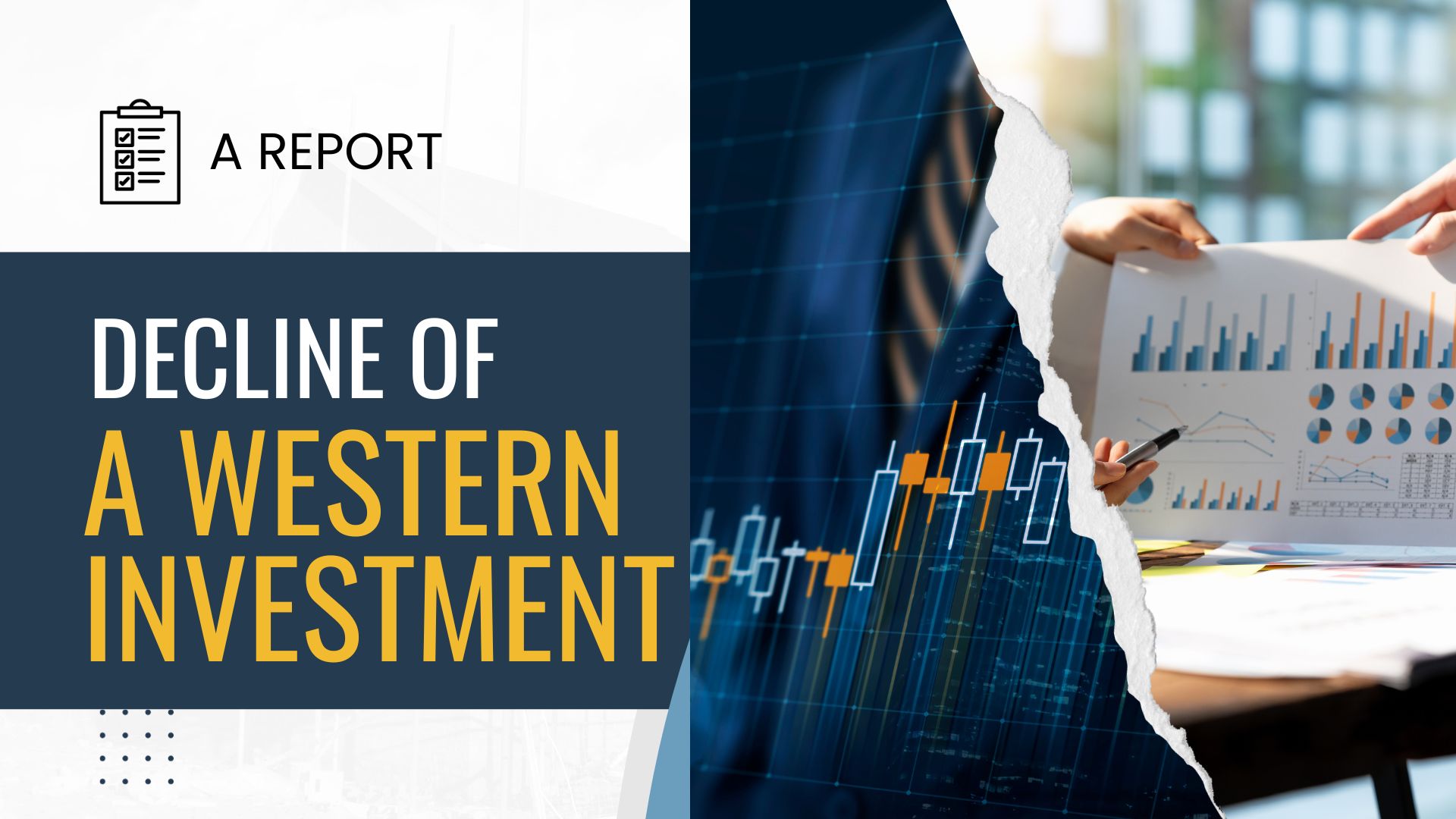The decline of Western investment in third world countries has been attributed to income inequality and ineffective incentives for risk-taking and wealth creation.
1. The Impact Of Income Inequality On Western Investment
| The Impact of Income Inequality on Western Investment |
| – The correlation between income inequality and Western investment decline |
Income inequality plays a significant role in the decline of Western investment in developing countries. A system with effective incentives is crucial for rapid development and high GDP per capita growth. Entrepreneurs, investors, and others who bear the risk and accelerate wealth creation need to be able to reap a significant portion of the incremental wealth. In an environment where income is distributed unequally, the motivation to invest decreases. The individuals with talent and willingness to bear risk, who are essential for economic growth, cannot accrue greater wealth and tap into a positive feedback loop. Thus, income inequality hampers Western investment in third world countries.
2. Key Factors Contributing To The Decline Of Western Investment
| Key Factors Contributing to the Decline of Western Investment |
| Political instability and its impact on investment decisions |
| Political instability in third-world countries has had a significant impact on Western investors’ decision-making process. The uncertainties surrounding political regimes, governance, and potential policy changes create a risky environment for investment. Investors prioritize stability and predictability to minimize financial risks, making them hesitant to invest in regions with political unrest. |
| Economic factors affecting Western investors’ confidence in third-world countries |
| Multiple economic factors influence Western investors’ confidence in third-world countries. These may include high inflation rates, currency fluctuations, inadequate infrastructure, and limited access to credit. Unfavorable economic conditions can decrease investors’ willingness to allocate their capital in such regions, as they perceive higher risks and lower potential returns. |
| The role of changing global market dynamics in Western investment decline |
| The changing global market dynamics also play a crucial role in the decline of Western investment. With the emergence of new economic powers and the shifting center of economic gravity, Western investors face increased competition and new investment opportunities in different regions. This diversification of investment destinations has led to a decline in Western investment in some third-world countries. |
3. Exploring The Consequences Of Declining Western Investment
A report about the decline of Western investment in third world countries has significant consequences for the potential economic stagnation in those nations. This decline widens the gap between developed and developing countries, creating inequalities in wealth and opportunities. Developing nations heavily rely on foreign investments for their growth and development, and the decline in Western investment poses a threat to their economic progress.
Furthermore, the implications of this decline extend to international collaboration and cooperation. In an interconnected world, investment flows between countries foster economic growth and shared benefits. However, the decline in Western investment hampers these collaborative efforts, making it challenging for developing countries to attract foreign investors and engage in mutually beneficial partnerships with developed nations.
Addressing the decline of Western investment requires strategic measures and policies to encourage investments in developing countries. By narrowing the gap between developed and developing nations, fostering economic growth, and promoting international cooperation, the potential economic stagnation in developing countries can be overcome.
4. Strategies For Reviving Western Investment In Developing Countries
Strategies for reviving Western investment in developing countries include:
- Promoting political stability and reducing corruption.
- Implementing favorable investment policies and regulations.
- Encouraging collaboration and partnerships between Western investors and local businesses.
5. The Future Of Western Investment In The Global Economy
The future of Western investment in the global economy holds various predictions and forecasts. One prominent factor is the potential for emerging markets to attract Western investors. These markets, with their rapid growth and development, offer lucrative opportunities for investors seeking high returns. Additionally, the role of technology and digitalization is reshaping Western investment patterns. As technology advances, it opens up new avenues and industries for investment, such as fintech and e-commerce. Western investors are increasingly diversifying their portfolios to include tech-focused companies and startups.
This shift in investment patterns is driven by the potential for high growth and innovation. The global economy is evolving, and Western investors need to adapt to stay competitive. By exploring emerging markets and technology-driven sectors, investors can capitalize on the changing landscape. It is crucial for Western investors to stay updated on market trends and identify promising investment opportunities. With careful analysis and strategic decision-making, Western investment in the global economy can thrive despite the challenges it may face.
Frequently Asked Questions For A Report About The Decline Of Western Investment
What Was Included In The Report About The Decline Of Western Investment In Third World Countries?
The report on Western investment decline in third world countries included information on the decrease of European airline flights.
Why Is Western Investment Declining In Third World Countries?
Western investment is declining in third world countries due to factors such as political instability, economic risks, and lack of infrastructure development. Additionally, changing global dynamics and shifting investment priorities have also contributed to this decline.
What Are The Effects Of The Decline Of Western Investment In Third World Countries?
The decline of Western investment in third world countries can have several negative effects, including reduced economic growth, limited job opportunities, and increased poverty. It can also hinder the development of critical sectors such as healthcare, education, and infrastructure.
How Can Third World Countries Attract More Investment From The West?
Third world countries can attract more investment from the West by implementing investor-friendly policies, improving infrastructure, enhancing legal and regulatory frameworks, and addressing corruption issues. They should also focus on creating a stable and conducive business environment to instill confidence in potential investors.
Conclusion
The decline of Western investment in third world countries is a complex issue with various factors at play. Income inequality has been a significant contributor to this decline, as it hinders the development of societies and their ability to attract investments.
For a society to thrive economically, it is crucial to have effective incentives that reward risk-takers and wealth creators. Entrepreneurs and investors need the opportunity to reap the benefits of their efforts, which leads to further wealth creation and economic growth.
Without a system that fosters this cycle, Western investment in developing countries will continue to decline. However, it is essential to remember that the decline of Western investment does not solely rest on income inequality. There are also other factors at play such as political instability, lack of infrastructure, and regulatory barriers that hinder foreign investments in these countries.
Addressing these issues requires a comprehensive approach involving governments, international organizations, and local communities working together to create an environment conducive to investment and economic growth. Ultimately, the decline of Western investment in third world countries is a multi-faceted challenge that requires collaborative efforts to overcome.
By addressing income inequality, political stability, and improving the investment climate, we can pave the way for increased Western investment and contribute to the economic development of these nations.

Alex Santcez is a seasoned financial blog writer known for his insightful analysis and expert commentary on a wide range of financial topics. With a background in finance and a keen understanding of market trends, Alex has established himself as a trusted voice in the financial blogging community. His well-researched and thought-provoking articles provide readers with valuable insights into investment strategies, economic developments, and personal finance management. Alex’s ability to break down complex financial concepts into digestible and accessible content has garnered him a dedicated following. Whether exploring the nuances of stock market fluctuations, offering tips on wealth management, or delving into the latest economic indicators, Alex Santcez’s contributions to the financial blogosphere consistently demonstrate a commitment to empowering readers with the knowledge needed to make informed financial decisions.


